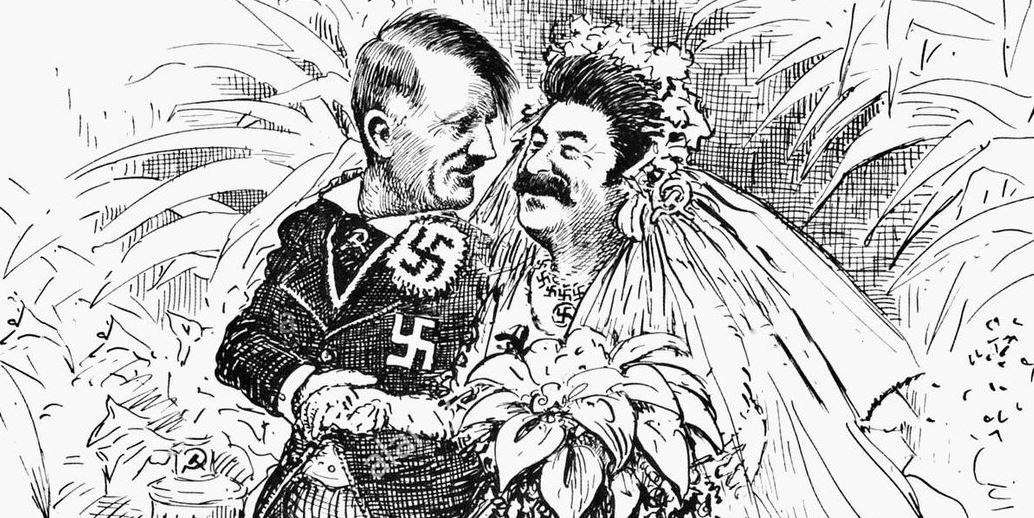
Hitler’s Views on Private Property and Nationalization
The answer to the question of Adolf Hitler’s position on private ownership and nationalization appears to be fairly simple. It is generally accepted that Hitler recognized private ownership of the means of production and rejected nationalization. To leave it at that, as is generally done, would mean being superficial because this statement is far too undifferentiated and leaves too many questions unanswered. In my book Hitler’s National Socialism I analyze the dictator’s economic and sociopolitical thinking.
Pollock: “Destruction of All the Essential Traits of Private Ownership”
In an article on the economic system of National Socialism published in 1941, the economist and sociologist Friedrich Pollock (a cofounder of the Institute for Social Research in Frankfurt, which later became the nucleus of the Frankfurt school) pointed out the following:
I agree that the legal institution of private ownership was maintained, and that many attributes characteristic for National Socialism begin to manifest themselves, albeit still vaguely, in non-totalitarian countries. But does this mean that the function of private ownership did not change? Is the “increase of power of a few groups” really the most important result of the change which took place? I believe it reaches far more deeply and should be described as the destruction of all the essential traits of private ownership, saving one exception. Even the mightiest concerns were denied the right to set up new fields of business in areas where the highest profits were to be expected, or to interrupt a production where it became unprofitable. These rights were transferred in their entirety to the ruling groups. The compromise between the groups in power initially determined the extent and direction of the production process. Faced with such a decision, the title of ownership is powerless, even if it is derived from the possession of the overwhelming majority of the share capital, let alone when it only owns a minority.
As we know, Hitler’s method rarely consisted of simply radically removing an institution or organization but rather of continuing to erode its inner substance until there was virtually nothing left of its original function or original content. For the sake of the analogy only, we should note that the constitution of Weimar was never repealed either but that its substance and intention were eroded little by little and thereby abolished in practice.
In his early speeches Hitler advocated the nationalization of land but in principle still came out in favor of private ownership. As becomes clear from Otto Wagener’s notes, Hitler’s skeptical position on nationalization had to do with his socio-Darwinist convictions. Otto Wagener, who from early January 1931 until June 1932 headed the Economic Policy Department of the NSDAP (Nationalsozialistische Deutsche Arbeiterpartei, or National Socialist German Workers’ Party) and was Hitler’s economic policy advisor, reports that Hitler had stated in 1930:
As far as this goes, the whole concept of nationalization in the form in which it has been attempted and demanded so far appears to me to be wrong, and I come to the same conclusion as Herr Wagener. We have to bring a process of selection into the matter in some way, if we want to come to a natural, healthy and also satisfying solution of the problem, a process of selection for those who should be entitled—and be at all permitted—to have a claim and the right to property and the ownership of companies.
On the other hand, Hitler frequently and emphatically stated that the disposal of his property was in no way the private affair of the industrialist. On October 9, 1934, for example, he declared:
Therefore wealth in particular does not only have greater possibilities for enjoyment, but above all greater obligations. The view that the utilization of a fortune no matter of what size is solely the private affair of the individual requires to be corrected all the more in the National Socialist state, because without the contribution of the community no individual would have been able to enjoy such an advantage.
For Hitler the formal maintenance of private ownership was not important. When the state has the unrestricted right to determine the decisions of the owners of the means of production, then the formal legal institution of private ownership no longer means very much. This is what Pollock is saying when he establishes a “destruction of all of the essential traits of private ownership” with one exception. The moment the owners of the means of production can no longer freely decide the content, timing, and size of their investments, the essential characteristics of private ownership have been abolished, even if the formal guarantee of private ownership still remains.
In his table talks on September 3, 1942, Hitler said that land was “national property, and in the end only given to the individual as a loan.” Hitler only recognizes private ownership insofar as it is used according to the principle “common benefit ahead of private benefit,” which means, concretely, insofar as land is used within the framework of the objectives set by the state. For Hitler the principle of “common benefit ahead of private benefit” means that if it is necessary in the common interest, the state has the right at all times to decide the way, the extent to which, and when private ownership is used, and the common interest is, of course, defined by the state.
In May 1937 Hitler declared:
I tell German industry for example, “You have to produce such and such now.” I then return to this in the Four-Year Plan. If German industry were to answer me, “We are not able to”, then I would say to it, “Fine, then I will take that over myself, but it must be done.” But if industry tells me, “We will do that”, then I am very glad that I do not need to take that on.
That such statements by Hitler were not empty threats became clear to the industrialists no later than on July 23, 1937, when Hermann Göring announced the formation of the “AG for Ore Mining and Iron Smelting Hermann Göring.” The development which had begun with Hitler’s and Göring’s repeated threats finally led to the creation of the Reichswerke Hermann Göring, which by 1940 employed six hundred thousand people. The plant in Salzgitter finally became the largest in Europe. With this, the National Socialist state had shown that its oft-proclaimed “primacy of politics” was deadly serious, and that it would not hesitate to become active itself and to build up state-controlled enterprises in areas where private industry resisted the execution of state directives. During a conversation on February 14, 1942, with Joseph Goebbels about the problem of increasing production, Hitler said: “[H]ere we have to proceed rigorously, that the whole production process has to be re-examined, and that the industrialists who do not want to submit to the directives we issue, will have to lose their plants without any regard to whether they will then be ruined economically.”
Hitler’s Role Model: Stalin and His Planned Economy
The National Socialists intended to expand the planned economy for the period after the war, as we know from many of Hitler’s remarks. He increasingly admired the Soviet economic system. “If Stalin had continued to work for another ten to fifteen years,” Hitler said at a small group meeting in August 1942,
Soviet Russia would have become the most powerful nation on earth, 150, 200, 300 years may go by, that is such a unique phenomenon! That the general standard of living rose, there can be no doubt. The people did not suffer from hunger. Taking everything together we have to say: They built factories here where two years ago there was nothing but forgotten villages, factories which are as big as the Hermann Göring Works.
On another occasion, also to his inner circle, he said that Stalin was a “genius” for whom one must have “unqualified respect,” especially given his comprehensive economic planning. There was no doubt in his mind, Hitler added, that in Soviet Russia, unlike in capitalist countries such as the United States, there has never been any unemployment.
On several occasions, the dictator mentioned to his closest associates that it was necessary to nationalize the large joint-stock companies, the energy industry, and all other branches of the economy that produced “essential raw materials” (e.g., the iron industry). Of course, the war was not the right environment to implement such radical nationalizations. Hitler and the National Socialists were well aware of this, and in any case, they had been making every effort to allay the nationalization fears of the country’s business community. Thus, a memo from SS chief Heinrich Himmler in October 1942 states that “during the war” a fundamental change of Germany’s capitalistic economy would not be possible. Anyone who “fought” against this would provoke a “witch-hunt” against himself. In a report prepared by an SS Hauptsturmführer in July 1944, the question “Why does the SS engage in business activities?” was answered as follows:
This question was raised specifically by circles who think purely in terms of capitalism and who do not like to see companies developing which are public, or at least of a public character. The age of the liberal system of business demanded the primacy of business, in other words business comes first, and then the state. As opposed to this, National Socialism takes the position: the state directs the economy, the state is not there for business, business is there for the state.
Mises: “Socialism with the Outward Appearance of Capitalism”
This was how Hitler and the National Socialists saw the very essence of the economic system they had established, but it was also how astute observers such as the economist Ludwig von Mises saw it. Incidentally, he came to the same conclusion as the left-wing economist Friedrich Pollock, quoted at the beginning of this article. On June 18, 1942, Mises wrote a letter to the editor of the New York Times. More clearly than many of his contemporaries and, above all, more clearly than many authors writing about National Socialism today, he recognized that
The German pattern of socialism (Zwangswirtschaft) is characterized by the fact that it maintains, although only nominally, some institutions of capitalism. Labor is, of course, no longer a “commodity”; the labor market has been solemnly abolished; the government fixes wage rates and assigns every worker the place where he must work. Private ownership has been nominally untouched. In fact, however, the former entrepreneurs have been reduced to the status of shop managers (Betriebsführer). The government tells them what and how to produce, at what prices and from whom to buy, at what prices and to whom to sell. Business may remonstrate against inexpedient injunctions, but the final decision rests with the authorities…. Market exchange and entrepreneurship are thus only a sham. The government, not the consumers’ demands, directs production; the government, not the market, fixes every individual’s income and expenditure. This is socialism with the outward appearance of capitalism—all-round planning and total control of all economic activities by the government. Some of the labels of capitalistic market economy are retained, but they signify something entirely different from what they mean in a genuine market economy.
As we know from Hitler’s statements, once the war ended, he wanted to push the development toward a state command economy even further. In his monologues to his inner circle (known as “table talks”) on July 27–28, 1941 Hitler said that “A sensible employment of the powers of a nation can only be achieved with a planned economy from above.” About two weeks later, he said: “As far as the planning of the economy is concerned, we are still very much at the beginning and I imagine it will be something wonderfully nice to build up an encompassing German and European economic order.”



